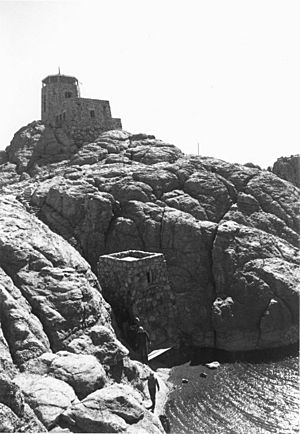Civilian Conservation Corps (CCC) South Dakota facts for kids
The Civilian Conservation Corps (CCC) was a special program in the United States during the 1930s. It helped solve two big problems at once: many young men didn't have jobs, and the country's natural places needed care. In South Dakota, the CCC gave work to thousands of people. They helped build and improve many important sites across the state.
Contents
The Civilian Conservation Corps in South Dakota
What Was the CCC?
In 1932, many young American men, aged 15 to 24, could only find part-time work. The country was going through a tough time called the Great Depression. To help, the government created the Civilian Conservation Corps (CCC). This program aimed to give jobs to young men. It also helped protect and improve America's natural resources, like forests and parks.
CCC's Impact in South Dakota
The CCC made a big difference in South Dakota. It provided jobs for 23,709 young men and military veterans. It also hired 4,554 Native Americans. Plus, 2,834 people worked in supervisory and office roles. The program sent about $6.2 million in paychecks to families in South Dakota. This money helped many people during a difficult time.
Amazing Projects Across South Dakota
CCC camps were set up all over South Dakota. Many were located in the Black Hills area. The men of the CCC built many important things. They constructed dams, roads, and fences. They also built bridges, put up signage, and created campgrounds. Their hard work left a lasting mark on the state.
Some CCC workers even helped at or near Mount Rushmore National Memorial. A few of these men worked for the famous sculptor Gutzon Borglum. They helped him with his amazing carving project before or after their time with the CCC.
Harney Peak Lookout: A CCC Masterpiece
One of the most famous CCC projects in South Dakota is the stone building on top of Harney Peak. This peak is one of the highest points between the Rocky Mountains and the Alps in Europe. The Harney Peak Lookout was built by CCC members from Camp Doran.
Building this lookout was a huge task! The workers used 7,000 surface stones and 15,000 hollow tiles. They also used 200 tons of sand and over 32,000 pounds of cement. They brought in 500 bricks, steel, and iron pieces. To get materials up the mountain, they used 300 poles, steel cable, and wire.
The lower floors of the lookout were made of strong concrete. The outer walls are 30 inches thick at the bottom. They are lined with hollow tiles for extra strength. The tower's roof was covered with copper sheets. Copper cables grounded the building to protect it from lightning. The rocks used for the walls and walkways came from nearby French Creek.
In 1935, the CCC also built a dam for a reservoir nearby. This dam could hold 5,000 gallons of water. Later, in 1938, they added a pumphouse and steps leading up to the tower. These additions made the lookout even more useful and accessible.


